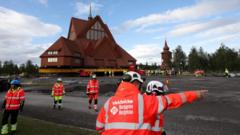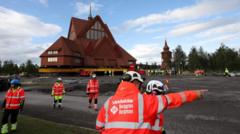The tragic loss of Kasem Abu al-Hija's family in a missile strike has prompted outrage in Tamra, highlighting the disparity in emergency preparedness resources for Arab communities in Israel. As the ongoing conflict escalates, residents express feelings of neglect and fear amid a struggle for equality and safety.
"Grief and Anger: The Impact of Conflict on Tamra's Arab Community"

"Grief and Anger: The Impact of Conflict on Tamra's Arab Community"
Kasem Abu al-Hija loses four family members to an Iranian missile strike, exposing deep-seated societal divides in Israel.
Article text:
"I am filled with rage," 67-year-old Kasem Abu al-Hija declares. On Saturday, a heartbreaking tragedy struck when four of his family members lost their lives due to an Iranian missile that directly hit their home in Tamra, a northern Israeli town. The missile’s impact led to the catastrophic collapse of their concrete structure, burying them under debris as screams of horror echoed through the streets.
Rescue teams combed through the wreckage, discovering books, clothes, and shattered remnants scattered across the roadway. The lives of Kasem's daughter, Manar Khatib, 45, her two granddaughters, Shada, aged 20, and Hala, aged 13, and their aunt, Manal Khatib, 41, were extinguished in a heartbeat, revealing the unspeakable grief of this close-knit family.
In chilling irony, a video clip surfaced mere moments after the tragedy, featuring individuals singing an anti-Arab chant, celebrating the missile strike. Their jubilant expressions clashed starkly with the sorrow in Tamra, as Kasem recounted, "They sang about my family's death," while attending a vigil surrounded by grieving relatives. Condemnation for the sentiments expressed in the video has echoed in various quarters, with Israeli President Isaac Herzog labeling it "appalling."
Yet, the outrage resonates beyond the missile strike and its aftermath; it highlights systemic issues faced by Arab-majority communities in Israel. Remarkably, Tamra, home to about 38,000 residents, lacks public bomb shelters, a stark contrast to the Jewish-majority town of Karmiel nearby, which boasts over 120 such facilities for its 55,000 residents.
Local authorities assert Arab communities have historically received significantly less funding for emergency preparedness. Lital Piller from the Israel Democracy Institute elaborated on the disparities in state funding, noting, "For many decades, Arab local authorities have received lower state funding across various areas, including emergency preparedness." This funding gap has left many Arab families without access to vital shelters, such as the reinforced safe rooms, or Mamads, mandated for new construction since the Gulf War.
With alarms suddenly interrupting the night, residents of Tamra found themselves hurriedly gathering in cramped safe rooms, seeking refuge from the relentless aerial attacks. The precariousness of their situation was palpable, with each boom echoing overhead inducing panic among families, forcing them to cling together in fear.
In a harsh twist of fate, the plight extends to Israel’s Bedouin communities, many of which live in unrecognized villages lacking essential shelters. A surge in hostility has exacerbated their struggles for necessities, further isolating vulnerable populations.
Social divides are starkly mirrored in public sentiment, with a recent survey revealing that 82.7% of Jewish Israelis support the military action against Iran, while a contrasting 67.9% of Arab Israelis oppose it. The disparity in feelings of safety and community support starkly divides the populations, encapsulating a feeling of neglect among Arab citizens.
Adel Khatib, a municipal official, voiced the pervasive anger, "We don't get the basic needs," lamenting the absence of cultural and community centers within Arab neighborhoods. Current statistics indicate that approximately 42% of the Arab population lives below the poverty line, a staggering figure compared to their Jewish counterparts.
Previous efforts to bridge these gaps, including a governmental five-year development plan aimed at improving Arab socioeconomic conditions, have faltered under the current right-wing administration. Critics have noted that funding previously allocated for development is now being diverted to support ongoing military actions.
In the wake of loss, community members gathered at Kasem’s home, sharing cups of coffee as they mourned together. "The bombs do not choose between Arabs or Jews," Kasem reflects solemnly, echoing a communal sentiment that transcends ethnic divides. "We must end this war. We must end it now."
"I am filled with rage," 67-year-old Kasem Abu al-Hija declares. On Saturday, a heartbreaking tragedy struck when four of his family members lost their lives due to an Iranian missile that directly hit their home in Tamra, a northern Israeli town. The missile’s impact led to the catastrophic collapse of their concrete structure, burying them under debris as screams of horror echoed through the streets.
Rescue teams combed through the wreckage, discovering books, clothes, and shattered remnants scattered across the roadway. The lives of Kasem's daughter, Manar Khatib, 45, her two granddaughters, Shada, aged 20, and Hala, aged 13, and their aunt, Manal Khatib, 41, were extinguished in a heartbeat, revealing the unspeakable grief of this close-knit family.
In chilling irony, a video clip surfaced mere moments after the tragedy, featuring individuals singing an anti-Arab chant, celebrating the missile strike. Their jubilant expressions clashed starkly with the sorrow in Tamra, as Kasem recounted, "They sang about my family's death," while attending a vigil surrounded by grieving relatives. Condemnation for the sentiments expressed in the video has echoed in various quarters, with Israeli President Isaac Herzog labeling it "appalling."
Yet, the outrage resonates beyond the missile strike and its aftermath; it highlights systemic issues faced by Arab-majority communities in Israel. Remarkably, Tamra, home to about 38,000 residents, lacks public bomb shelters, a stark contrast to the Jewish-majority town of Karmiel nearby, which boasts over 120 such facilities for its 55,000 residents.
Local authorities assert Arab communities have historically received significantly less funding for emergency preparedness. Lital Piller from the Israel Democracy Institute elaborated on the disparities in state funding, noting, "For many decades, Arab local authorities have received lower state funding across various areas, including emergency preparedness." This funding gap has left many Arab families without access to vital shelters, such as the reinforced safe rooms, or Mamads, mandated for new construction since the Gulf War.
With alarms suddenly interrupting the night, residents of Tamra found themselves hurriedly gathering in cramped safe rooms, seeking refuge from the relentless aerial attacks. The precariousness of their situation was palpable, with each boom echoing overhead inducing panic among families, forcing them to cling together in fear.
In a harsh twist of fate, the plight extends to Israel’s Bedouin communities, many of which live in unrecognized villages lacking essential shelters. A surge in hostility has exacerbated their struggles for necessities, further isolating vulnerable populations.
Social divides are starkly mirrored in public sentiment, with a recent survey revealing that 82.7% of Jewish Israelis support the military action against Iran, while a contrasting 67.9% of Arab Israelis oppose it. The disparity in feelings of safety and community support starkly divides the populations, encapsulating a feeling of neglect among Arab citizens.
Adel Khatib, a municipal official, voiced the pervasive anger, "We don't get the basic needs," lamenting the absence of cultural and community centers within Arab neighborhoods. Current statistics indicate that approximately 42% of the Arab population lives below the poverty line, a staggering figure compared to their Jewish counterparts.
Previous efforts to bridge these gaps, including a governmental five-year development plan aimed at improving Arab socioeconomic conditions, have faltered under the current right-wing administration. Critics have noted that funding previously allocated for development is now being diverted to support ongoing military actions.
In the wake of loss, community members gathered at Kasem’s home, sharing cups of coffee as they mourned together. "The bombs do not choose between Arabs or Jews," Kasem reflects solemnly, echoing a communal sentiment that transcends ethnic divides. "We must end this war. We must end it now."






















